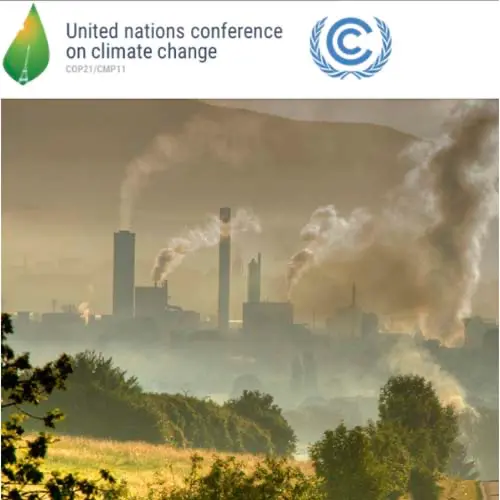Hoe presenteert het bedrijfsleven zich op klimaattop Parijs?
Of de klimaattop Parijs slaagt hangt af van de vraag of het aantal klimaatinitiatieven van landen voldoende is om binnen de 2 graden opwarming van de aarde te blijven. Maar bedrijven leveren ook een bijdrage in de vorm van ‘We Mean Business’.
De klimaattop in Parijs is georganiseerd in het centrum Paris-Le Bourget, dat voor een groot deel voor het publiek is afgesloten, zeker na de recente aanslagen. In de afgesloten Blue Zone presenteert het internationale bedrijfsleven en institutionele beleggers zich, voor de gelegenheid gebundeld tot het initiatief ‘We Mean Business’. Er is echter ook een deel voor het publiek opengesteld, waar ook getoond wordt waar de Klimaattop om draait. Wie de tocht waagt moet weten dat Parijs met de komst van 147 staatshoofden en 40 duizend andere conferentiegangers tot een vesting is omgebouwd. Niet minder dan 6.300 agenten en militairen waken over de veiligheid en dat gaat gepaard met afsluitingen van belangrijke wegen. Parijzenaars wordt gewaarschuwd zelfs de metro en ander openbaar vervoer 'alleen indien noodzakelijk' te gebruiken: 'Blijf thuis'. Geen grote demonstraties dus, in Parijs. De klimaatmarsen worden nu in andere wereldsteden georganiseerd. Marjan Minnesma arriveerde veilig in de Lichtstad, voor de Sacre Coeur.
We citeren de website met het statement waarover het meer duurzame deel van het internationale bedrijfsleven en topleiders het over eens zijn. Er zitten spannende doelstellingen bij.
It is clear that fair, equitable, high-quality growth can no longer be sustained unless climate risk is addressed.
To reduce this risk, companies need to find new ways of doing business. The sooner this is accomplished, the less disruptive and more cost-effective the transition will be.
The low carbon revolution is already offering huge opportunities for business, the economy and society as a whole. Companies have the potential to unleash a wave of innovation in low carbon technologies, creating new products and services, generating employment, reducing energy consumption and increasing savings if the right policies are in place.
The resulting new clean energy economy will improve public health, provide greater energy security and contribute to poverty alleviation for billions of people around the world.
Many businesses have helped kick-start this movement by setting ambitious targets, reporting emissions and scaling up low carbon investment. The necessary change needed to address climate change, however, is not happening fast enough. Further action from government will help more and more companies take this to scale.
Businesses need policies that help them scale up clean energy and energy efficiency conserve natural resources and send the right price signals to drive investment in low carbon technologies and build resilience into workforce and communities most affected by climate impacts.
By working together, business and government can meet the climate change challenge and help create a better, safer and healthier world for all.
Policy to enable ambitious climate action
The world’s leading scientists and governments agree that we must limit global temperature rise to 2 degrees Celsius. To do so, there is growing recognition that we cannot exceed collective emissions of 1 trillion tons of carbon. Since the start of industrialization, we have emitted 0.58 trillion tons. We accept this assessment and therefore believe a commensurate policy response is essential.
As such, by 2015, we ask policymakers to help the private sector go further by:
+ Increasing the level of urgency and ambition in government action to stabilize global emissions before the end of this decade
+ Continuing to implement domestic policies through to 2030 that support bold business action to cut emissions, including:
◦ Eliminating subsidies that incentivize high-carbon energy
◦ Enacting meaningful pricing of carbon
◦ Ending deforestation
◦ Putting in place robust energy efficiency standards
◦ Supporting for scale-up of renewable energy
◦ Ensuring that all policy regimes dealing with fiscal, energy, industry and trade related issues provide actionable incentives for an early transition to a low carbon future
+ Establishing a clear long-term global goal that provides the necessary direction to decision makers, such as (net) zero emissions well before the end of the century;
+ Enhance existing mechanisms by which we improve transparency and accountability in monitoring climate ambition and action, and ensure a stable and predictable low carbon investment environment;
+ Continuing to scale up public finance to support resilience-building and accelerate low carbon investment by the private sector

